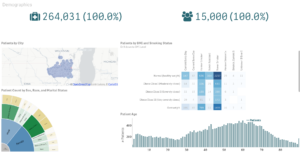Predictive analytics in healthcare is a challenge. Many who have taken on the challenge will be the first to admit their industry trails behind others when it comes to predictive analytics. As healthcare analytics professionals, there is no getting around that fact, but why is healthcare behind? Some argue it is due to the complex nature of healthcare and the vast sea of data connected to each individual patient. Every patient who enters the care of healthcare professionals carries with them a unique history, diagnoses, and existing conditions. It is these details that make it challenging for healthcare to ascend to the next level in predictive modeling. There is no shortage of the data needed to predict outcomes, but connecting and associating that data in a way that can accurately predict patient outcomes is often complex and less than straightforward.
Google is tackling this challenge after embarking on a healthcare data collection project. Partnering with the University of California San Francisco Medical Center (UCSF) and University of Chicago Medicine, they gathered the de-identified data of 216,221 adults, with more than 46 billion data points that span 11 years.
As impressive as the volume of data sounds, the true value of this project is in identifying and harnessing the critical elements out of frequently incomplete, inconsistent, and confidential data. For that reason, in addition to collecting this information, Google coupled it with deep learning neural networks that harvest and relate the information that is most critical for predicting outcomes. With this new level of advanced analysis, these networks can pinpoint the relevant details – and omit irrelevant ones – needed to predict how long a patient might stay after admission or what their mortality probability is based on their history.

Let’s not forget the confidential nature of the data – how did Google obtain this data in a de-identified fashion? UCSF’s Enterprise Information and Analytics Team partnered with Prominence Advisors to develop a tool that they now use for research and for de-identifying the data for the Google project. The tool can maintain all the logical relationships a patient and their data has throughout the system while still following HIPAA guidelines and removing all information that could be used to identify the patient. UCSF, with Prominence, has used similar data sets to launch analytics that monitor readmission rates as well as monitor and control preventable hospital and workplace harm events.
Predictive analytics is on everyone’s roadmap. It is now more achievable by building on ever-increasing electronic data sets and advanced analytics technologies. At Prominence, we’re ready to guide you through this journey and help propel you to the next level. Find out more about our analytics team here.